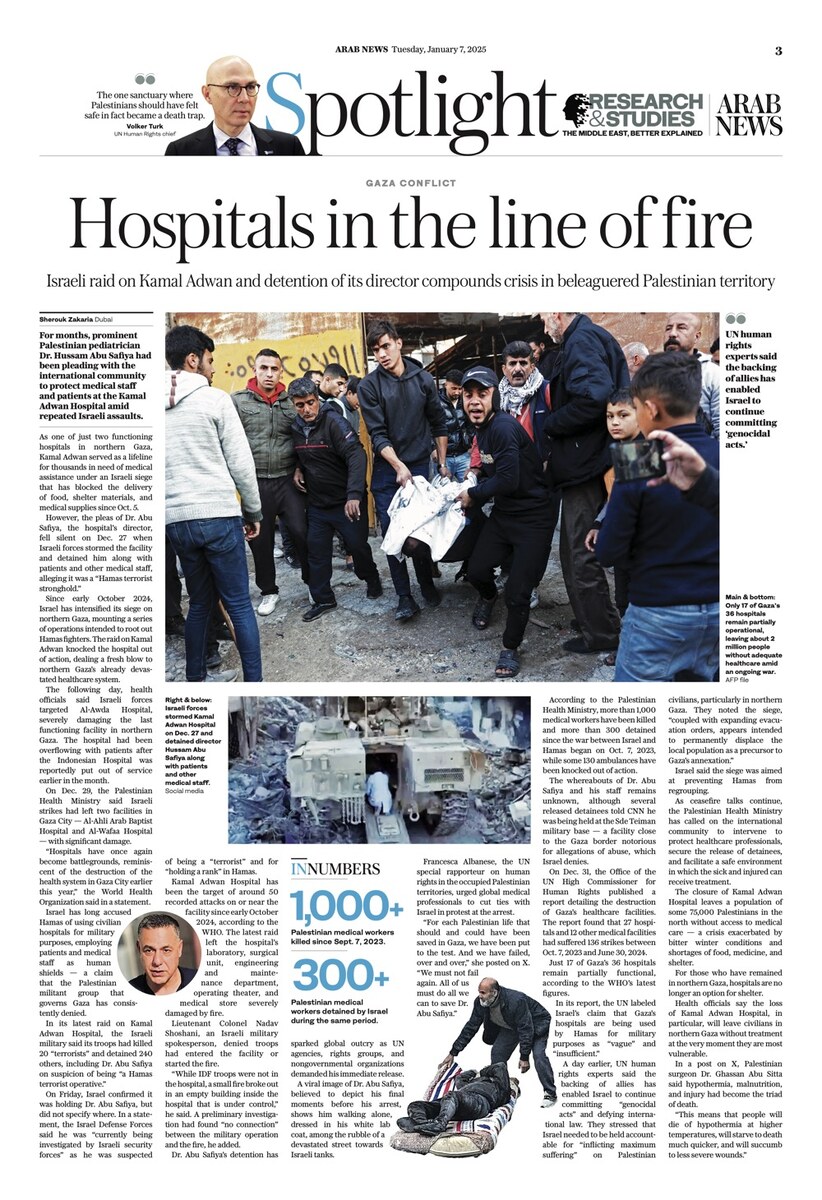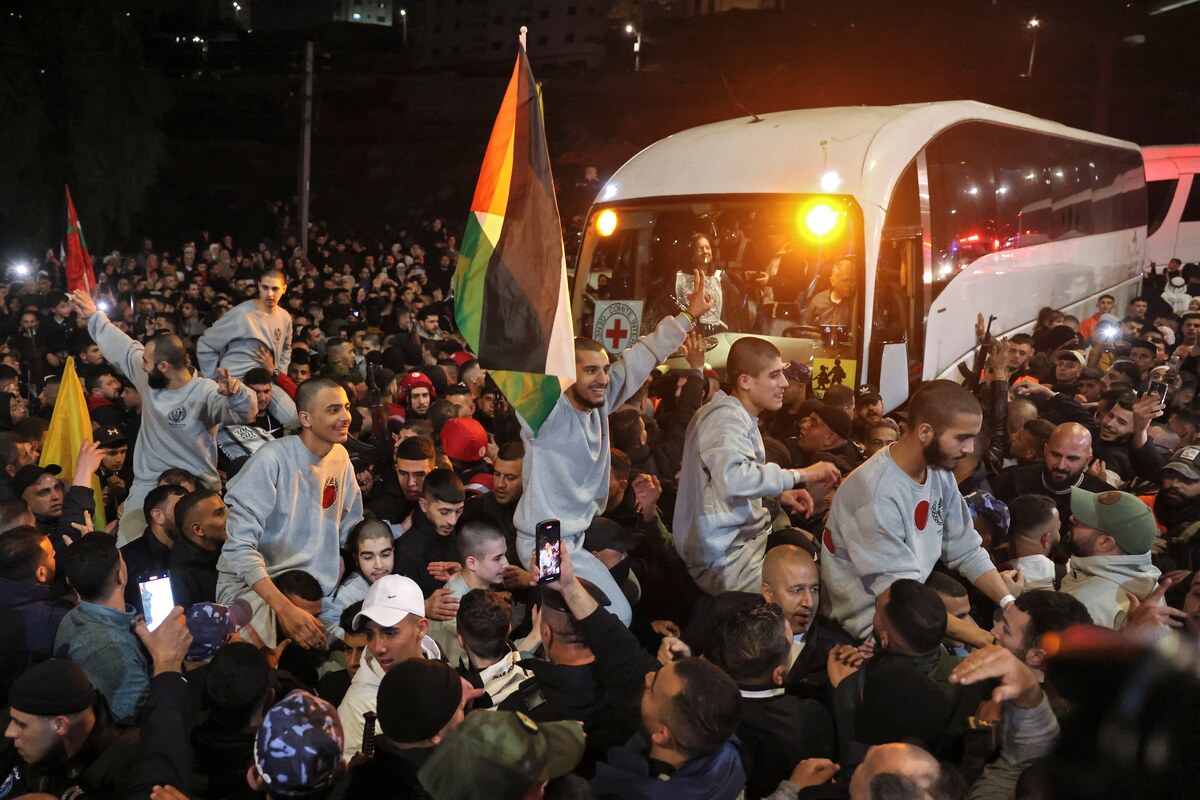DUBAI: For months, prominent Palestinian pediatrician Dr. Hussam Abu Safiya had been pleading with the international community to protect medical staff and patients at the Kamal Adwan Hospital amid repeated Israeli assaults.
As one of just two functioning hospitals in northern Gaza, Kamal Adwan served as a lifeline for thousands in need of medical assistance under an Israeli siege that has blocked the delivery of food, shelter materials, and medical supplies since Oct. 5.
However, the pleas of Dr. Abu Safiya, the hospital’s director, fell silent on Dec. 27 when Israeli forces stormed the facility and detained him along with patients and other medical staff, alleging it was a “Hamas terrorist stronghold.”
Since early October 2024, Israel has intensified its siege on northern Gaza, mounting a series of operations intended to root out Hamas fighters. The raid on Kamal Adwan knocked the hospital out of action, dealing a fresh blow to northern Gaza’s already devastated healthcare system.

Since early October 2024, Israel has intensified its siege on northern Gaza. (AFP)
The following day, health officials said Israeli forces targeted Al-Awda Hospital, severely damaging the last functioning facility in northern Gaza. The hospital had been overflowing with patients after the Indonesian Hospital was reportedly put out of service earlier in the month.
On Dec. 29, the Palestinian health ministry said Israeli strikes had left two facilities in Gaza City — Al-Ahli Arab Baptist Hospital and Al-Wafaa Hospital — with significant damage.
“Hospitals have once again become battlegrounds, reminiscent of the destruction of the health system in Gaza City earlier this year,” the World Health Organization said in a statement.
Israel has long accused Hamas of using civilian hospitals for military purposes, employing patients and medical staff as human shields — a claim that the Palestinian militant group that governs Gaza has consistently denied.
In its latest raid on Kamal Adwan Hospital, the Israeli military said its troops had killed 20 “terrorists” and detained 240 others, including Dr. Abu Safiya on suspicion of being “a Hamas terrorist operative.”

Israel has long accused Hamas of using civilian hospitals for military purposes. (AFP)
On Friday, Israel confirmed it was holding Dr. Abu Safiya, but did not specify where. In a statement, the Israel Defense Forces said he was “currently being investigated by Israeli security forces” as he was suspected of being a “terrorist” and for “holding a rank” in Hamas.
Israel launched its military operation in Gaza in retaliation for the Oct. 7, 2023, Hamas-led attack on southern Israel that killed some 1,200 people, most of them civilians, and saw around 250 taken hostage, including many foreign nationals.
The air and ground campaign in Gaza has caused the death of some 45,400 Palestinians, more than half of them women and children, and left 108,000 wounded, according to the Palestinian health ministry. Around 100 Israelis remain captive in Gaza, but a third are believed to be dead.
Kamal Adwan Hospital has been the target of around 50 recorded attacks on or near the facility since early October 2024, according to the WHO.
The latest raid left the hospital’s laboratory, surgical unit, engineering and maintenance department, operating theater, and medical store severely damaged by fire.

Healthcare workers around the world joined an online solidarity campaign. (AFP)
Lieutenant Colonel Nadav Shoshani, an Israeli military spokesperson, denied troops had entered the facility or started the fire.
“While IDF troops were not in the hospital, a small fire broke out in an empty building inside the hospital that is under control,” he said. A preliminary investigation had found “no connection” between the military operation and the fire, he added.
Dr. Abu Safiya’s detention has sparked global outcry as UN agencies, rights groups, and non-governmental organizations demanded his immediate release.
Opinion
This section contains relevant reference points, placed in (Opinion field)
A viral image of Dr. Abu Safiya, believed to depict his final moments before his arrest, shows him walking alone, dressed in his white lab coat, among the rubble of a devastated street towards Israeli tanks.
Healthcare workers around the world joined an online solidarity campaign, prompting the launch of a petition calling on the US to pressure Israel to release Dr. Abu Safiya and stop targeting hospitals, medical staff, and patients.
Francesca Albanese, the UN special rapporteur on human rights in the occupied Palestinian territories, urged global medical professionals to cut ties with Israel in protest at the arrest.
“For each Palestinian life that should and could have been saved in Gaza, we have been put to the test. And we have failed, over and over,” she posted on X. “We must not fail again. All of us must do all we can to save Dr. Abu Safiya.”
According to the Palestinian health ministry, more than 1,000 medical workers have been killed and more than 300 detained since the war between Israel and Hamas began on Oct. 7, 2023, while some 130 ambulances have been knocked out of action.

Israel launched its military operation in Gaza in retaliation for the Oct. 7, 2023. (AFP)
The whereabouts of Dr. Abu Safiya and his staff remains unknown, although several released detainees told CNN he was being held at the Sde Teiman military base — a facility close to the Gaza border notorious for allegations of abuse, which Israel denies.
Dr. Abu Safiya rose to prominence for documenting the challenges facing healthcare professionals in Gaza since the war began, including shortages of staff and medical supplies.
In an earlier raid on Oct. 25, he was briefly detained and questioned after refusing multiple orders to leave Kamal Adwan Hospital. The Israeli army had stormed the facility, detained many patients and 57 hospital staff, according to Gaza health authorities.
During that Israeli operation, Dr. Abu Safiya’s 15-year-old son was reportedly killed in a drone strike at the hospital gate. Dr. Abu Safiya insisted on continuing to tend to his patients, and continued to do so even after he was wounded in an attack on Nov. 23.
“We are suffering from a severe shortage of doctors, especially surgeons,” he said at the time. “Right now, we only have pediatricians — it is a huge challenge to work under these circumstances.”
On Dec. 31, the Office of the UN High Commissioner for Human Rights published a report detailing the destruction of Gaza’s healthcare facilities. The report found that 27 hospitals and 12 other medical facilities had suffered 136 strikes between Oct. 7, 2023 and June 30, 2024.
The UN warned that the strikes caused “significant damage to, if not the complete destruction of, civilian infrastructure,” and pushed the healthcare system in the Palestinian territory to the “brink of total collapse.”

In its report, the UN labeled Israel’s claim that Gaza’s hospitals are being used by Hamas for military purposes as “vague” and “insufficient.” (AFP)
Just 17 of Gaza’s 36 hospitals remain partially functional, according to the WHO’s latest figures.
In its report, the UN labeled Israel’s claim that Gaza’s hospitals are being used by Hamas for military purposes as “vague” and “insufficient.”
A day earlier, UN human rights experts said the backing of allies has enabled Israel to continue committing “genocidal acts” and defying international law. They stressed that Israel needed to be held accountable for “inflicting maximum suffering” on Palestinian civilians, particularly in northern Gaza.
They noted the siege, “coupled with expanding evacuation orders, appears intended to permanently displace the local population as a precursor to Gaza’s annexation.”
Israel said the siege was aimed at preventing Hamas from regrouping.
As ceasefire talks continue, the Palestinian health ministry has called on the international community to intervene to protect healthcare professionals, secure the release of detainees, and facilitate a safe environment in which the sick and injured can receive treatment.
The closure of Kamal Adwan Hospital leaves a population of some 75,000 Palestinians in the north without access to medical care — a crisis exacerbated by bitter winter conditions and shortages of food, medicine, and shelter.
More than 90 percent of Gaza’s 2.3 million Palestinians have been repeatedly displaced, according to aid agencies, with many now enduring winter temperatures in squalid tent camps, often flooded by heavy rain, in south and central Gaza.
For those who have remained in northern Gaza, hospitals are no longer an option for shelter.
“As if the relentless bombing and the dire humanitarian situation in Gaza were not enough, the one sanctuary where Palestinians should have felt safe in fact became a death trap,” Volker Turk, the UN human rights chief, said in a statement.

The closure of Kamal Adwan Hospital leaves a population of some 75,000 Palestinians in the north without access to medical care. (AFP)
Health officials say the loss of Kamal Adwan Hospital, in particular, will leave civilians in northern Gaza without treatment at the very moment they are most vulnerable.
In a post on X, Palestinian surgeon Dr. Ghassan Abu Sitta said hypothermia, malnutrition, and injury had become the triad of death.
“This means that people will die of hypothermia at higher temperatures, will starve to death much quicker, and will succumb to less severe wounds.”































